Overview
This article highlights the vital social skills that are essential for the development of children with autism. It underscores the importance of skills such as:
- Initiating conversations
- Interpreting social cues
- Emotional awareness
These abilities are crucial for enhancing interpersonal interactions. Research supports this, showing significant improvements in social competencies following targeted training and early intervention strategies. By focusing on these skills, we can foster a more supportive environment for our children, helping them thrive socially and emotionally.
Introduction
In a world where social interactions are vital for personal and professional success, the significance of social skills training for children with autism is profound. As developmental disorders become more common, families are increasingly seeking effective strategies to empower their children to navigate the complexities of social environments. This article explores ten essential social skills that can greatly enhance the lives of children on the autism spectrum. It offers valuable insights into practical approaches and supportive resources.
What challenges do parents encounter in nurturing these skills, and how can targeted interventions create a transformative impact on their children's social development?
About ASD Media: Empowering Parents with Social Skills Resources
At ASD Media, we are deeply committed to enhancing the implementation of ABA therapy, offering valuable insights and strategies tailored for both parents and professionals. Our resources focus on enhancing social abilities by providing families with a list of social skills for autism that equips them to navigate the complexities of developmental disorders.
We understand the challenges you face, and by fostering a nurturing community, we ensure that parents have access to a list of social skills for autism, enabling them to find the latest information and strategies to help their children thrive socially.
Together, we can build a supportive environment where every child has the opportunity to flourish.
Social Skills Training: Building Foundations for Effective Communication
Training in social abilities, as outlined in the list of social skills for autism, is vital for children on the autism spectrum, laying the groundwork for effective communication. This essential training teaches children a list of social skills for autism, including:
- How to initiate conversations
- Maintain eye contact
- Interpret social cues
Studies reveal that three out of four students with autism see improved interactions after skills training (SST), with an overall effect size noted as medium to large at 0.83. Approaches such as modeling, role-playing, and direct instruction have shown remarkable improvements in a young person’s ability to connect with peers and adults, fostering better relationships and integration. For instance, a study found that children participating in SST increased their overall competencies from an average score of 101.25 to 129 following intervention.
Furthermore, the Social Abilities Enhancement System (SSIS) has been updated to include additional subscales, enhancing its reliability in assessing interpersonal skills. Experts emphasize that effective communication strategies, including the use of peer models, can lead to significant improvements in social abilities, as outlined in the list of social skills for autism, which is evidenced by the success of programs like PEERS.
As the prevalence of developmental disorders continues to rise, with estimates suggesting 1 in 54 children affected, the need for effective interpersonal skills training has never been more critical. By implementing these strategies, we can significantly improve the quality of life for youth with autism, helping them navigate social environments more effectively.
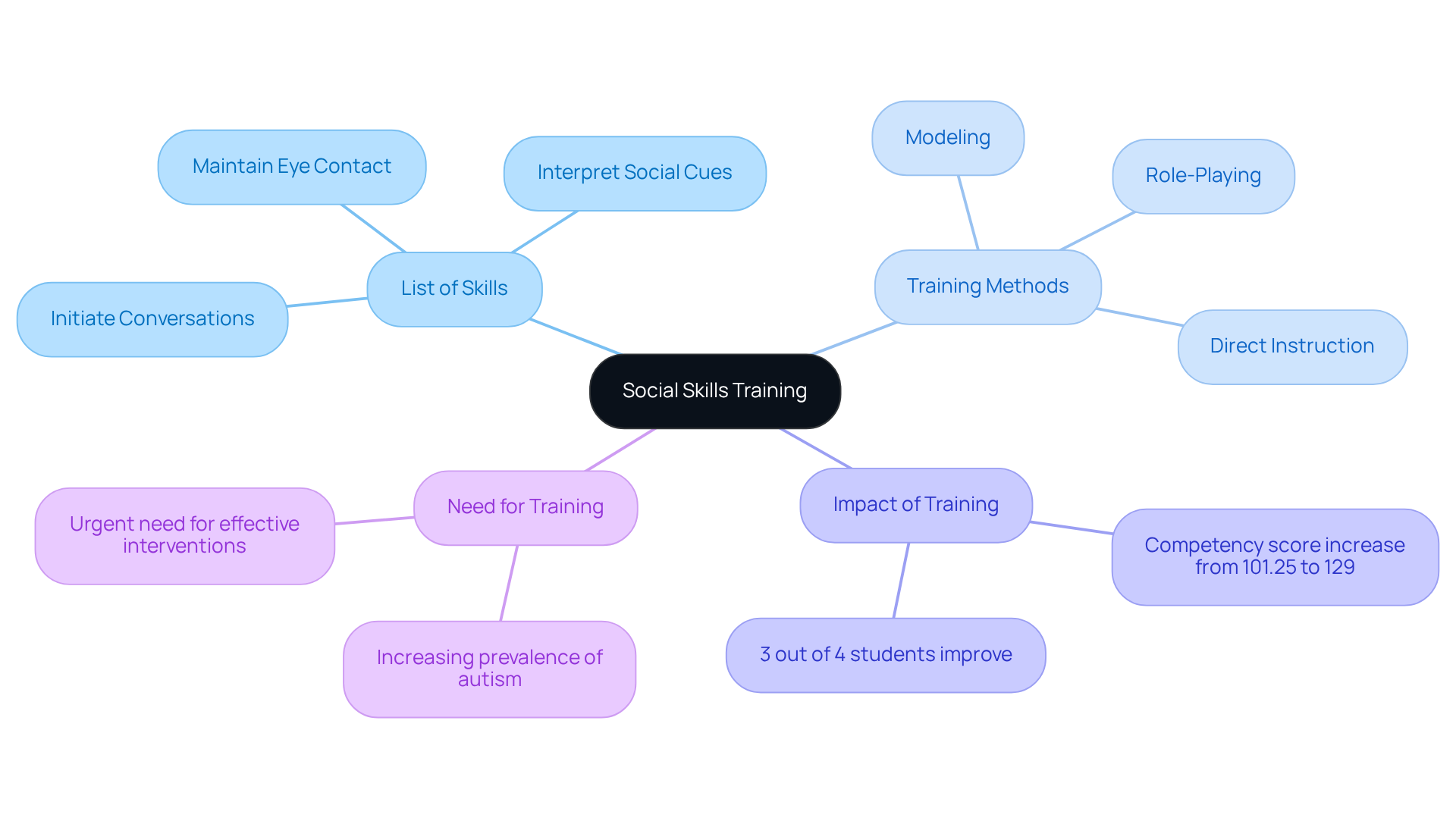
Role-Playing Exercises: Practicing Real-Life Social Scenarios
Role-playing activities serve as a wonderful way for young individuals to practice real-life interpersonal scenarios. By simulating situations like greeting a friend or asking for help, children can explore appropriate responses and behaviors in a safe environment. This nurturing approach not only builds their confidence but also allows them to navigate various interpersonal dynamics, preparing them to handle similar situations in real life. As parents, encouraging these activities can significantly support your child's social development and emotional growth.
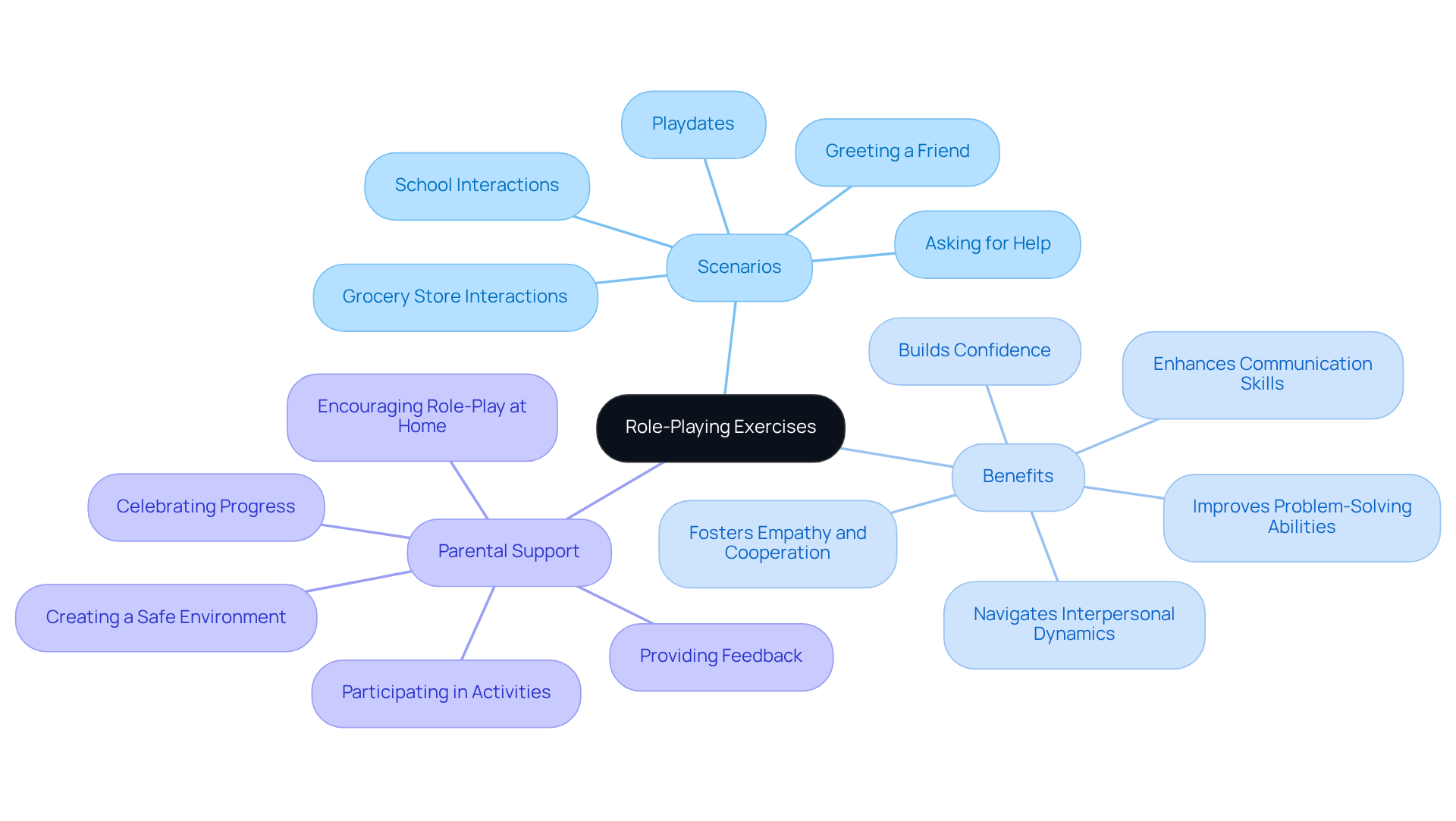
Social Stories: Guiding Children Through Social Situations
Personalized narratives play a vital role in helping children with autism understand social situations and expectations. Imagine a child preparing to attend a birthday party or learning to share toys. These stories offer clear guidance on appropriate behaviors and responses, making the experience less daunting. Not only do they equip children for upcoming events, but they also support their understanding of emotions and reactions in various interpersonal contexts. By embracing this method, we can nurture their growth and confidence in social interactions.
Visual Supports: Enhancing Understanding of Social Interactions
Visual aids, such as charts, images, and cue cards, are invaluable in enhancing our children's understanding of interpersonal interactions. These tools not only illustrate interpersonal signals and expected actions but also convey emotional expressions, making complex relational ideas more accessible for young minds. Imagine the difference it can make when children can visually grasp these concepts!
By incorporating visual supports into everyday activities, we empower our children with a list of social skills for autism to navigate social situations with greater confidence and clarity.
Let’s work together to create a supportive environment where our young ones can thrive in their social interactions.
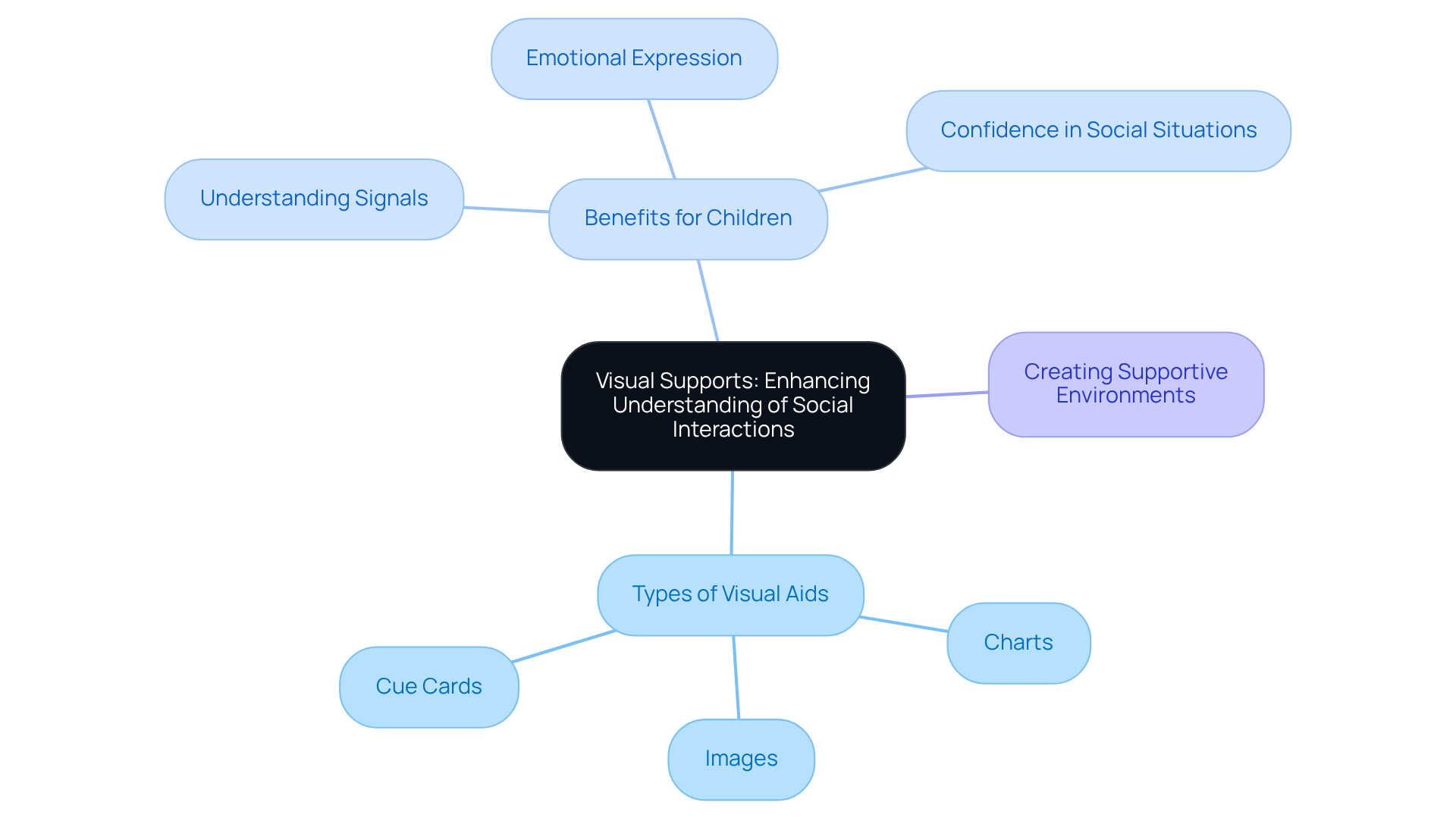
Peer Interaction Opportunities: Fostering Social Connections
Creating opportunities for peer interactions is vital for fostering meaningful connections among young individuals with developmental disorders, and it can be supported by a list of social skills for autism. By organizing playdates, group activities, and inclusive classroom settings, we can cultivate a nurturing environment where children can enhance their interpersonal skills, which are included in the list of social skills for autism. These interactions not only improve communication abilities but also help forge friendships and a sense of belonging—key components for emotional well-being. In fact, statistics reveal that 43% of adolescents with developmental disorders do not engage with peers outside of school, underscoring the importance of promoting these interpersonal connections.
Experts emphasize that structured environments help youth develop a list of social skills for autism, enabling them to navigate social dynamics, learn to share, and understand social cues. This ultimately leads to improved interpersonal competence. As developmental specialists point out, nurturing these connections is crucial for building resilience and confidence in young individuals, empowering them to thrive in various social settings.
To effectively organize structured playdates, parents can begin by:
- Inviting a small group of peers
- Planning engaging activities that promote interaction, such as games or collaborative projects
This simple step can make a significant difference in their social development.
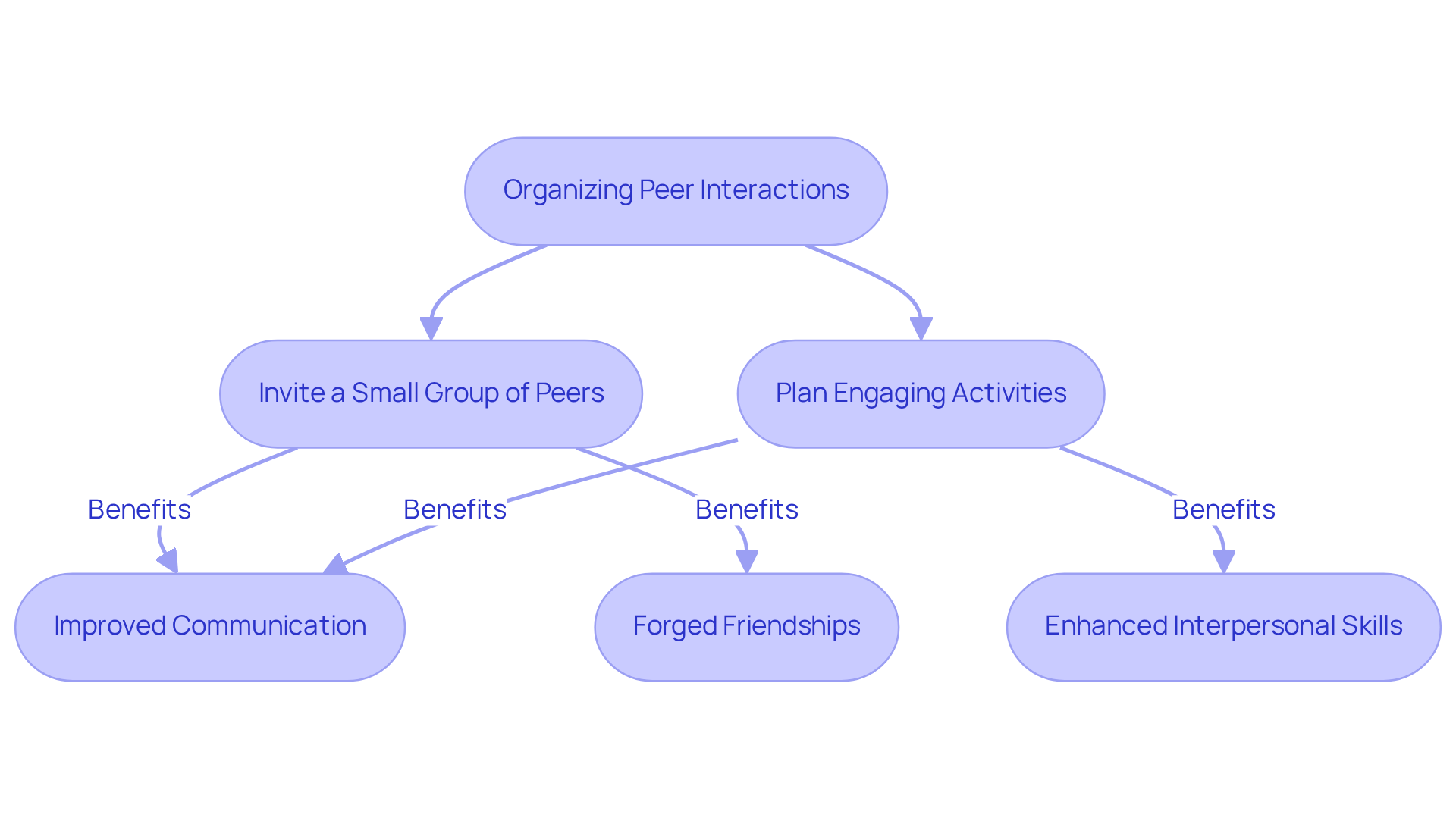
Emotional Skills: Understanding and Expressing Feelings in Social Settings
Emotional awareness plays a vital role in developing social abilities for individuals with autism. Many on the spectrum struggle to recognize their own feelings and interpret emotional signals from others. Teaching emotional skills is crucial; it involves helping young individuals identify their emotions, understand the context of various feelings, and practice appropriate responses. Engaging activities—like emotion charades or analyzing characters' feelings in stories—can significantly enhance emotional awareness and regulation.
Research shows that children with autism who engage in structured emotional skills programs experience notable improvements in their ability to recognize and express emotions. Programs that incorporate role-playing and interpersonal narratives have proven effective in fostering emotional understanding. Psychologists emphasize that cultivating emotional awareness not only aids in interpersonal interactions but also enhances overall emotional regulation, essential for navigating different environments.
Statistics reveal that young individuals on the spectrum often lag behind their peers in emotional skills development, with studies indicating they are considerably less likely to identify and respond to emotional signals. This underscores the need for targeted interventions. Effective programs highlight the importance of emotional awareness in social settings and provide a list of social skills for autism, equipping youngsters with the tools to interact meaningfully with others. By nurturing these skills, caregivers and educators can help children with developmental disorders build stronger social connections and improve their overall quality of life.
Moreover, the typical age for diagnosing developmental disorders is around 5 years, with initial interventions commonly occurring at approximately 4.7 years. This emphasizes the critical window for developing emotional abilities early on. Additionally, emotional support from positive affirmations is crucial in reducing stress and enhancing overall well-being for caregivers, creating a nurturing environment for children to thrive.
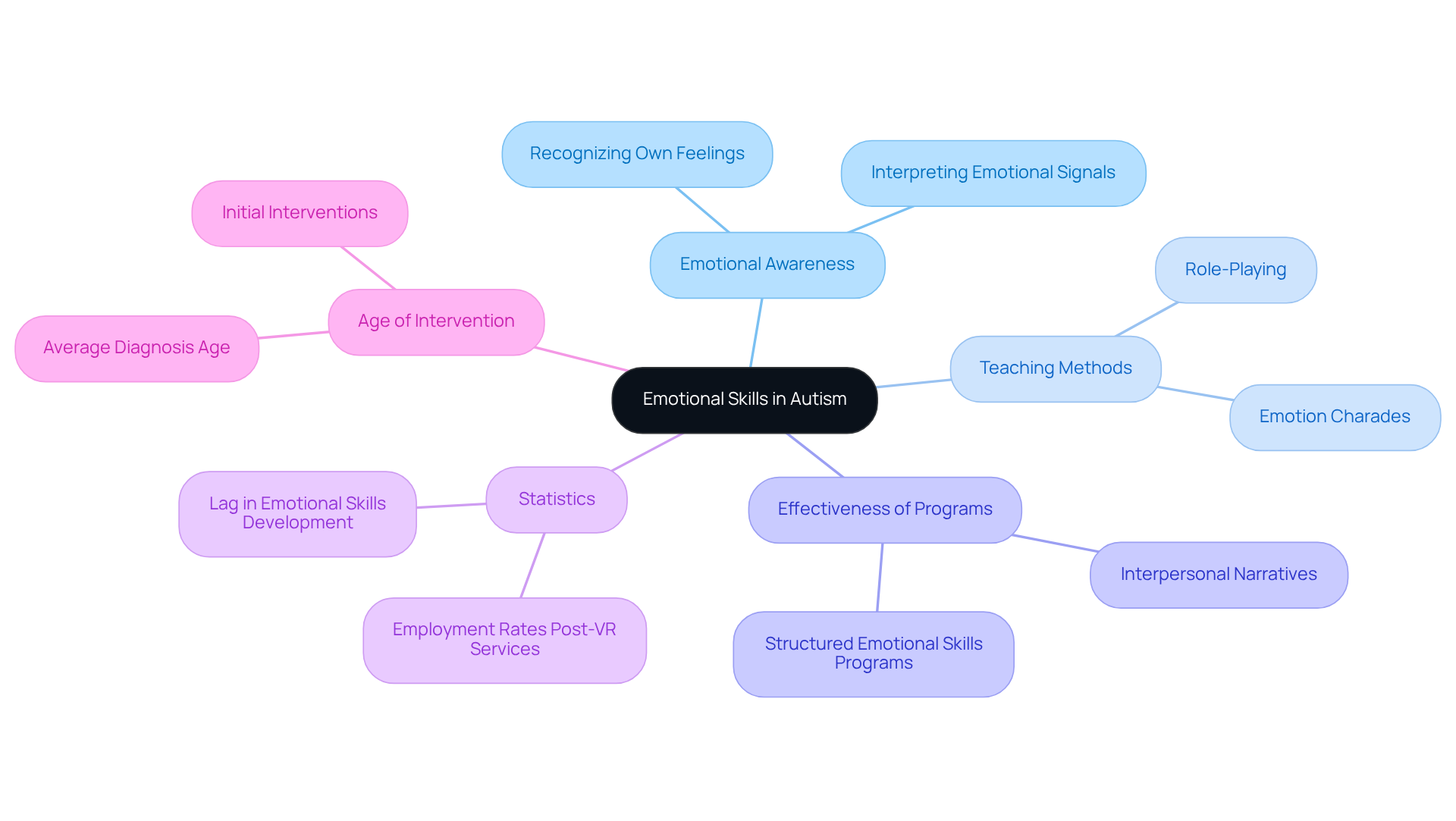
Problem-Solving Skills: Navigating Social Challenges with Confidence
Problem-solving abilities are vital for helping individuals with autism navigate social challenges with confidence. Teaching these skills involves guiding young individuals through a structured process:
- Identifying a challenge
- Brainstorming potential solutions
- Evaluating the outcomes of their choices
Engaging in role-playing scenarios allows children to practice these skills in a safe environment, preparing them for real-life situations where they may need to resolve conflicts or make decisions.
Research indicates that children who receive targeted problem-solving training show significant improvements in their ability to manage interactions, leading to better relationships with peers. For instance, case studies reveal that children involved in problem-solving activities demonstrate marked enhancement in their interpersonal skills, enabling them to tackle challenges more effectively. By fostering these skills, educators can support young individuals on the spectrum in building resilience and adaptability—qualities that are essential for successful social interactions, as included in the list of social skills for autism.
In the U.S., approximately 1 in 36 children are affected by autism, underscoring the necessity of nurturing these skills early on. The CDC states, 'Early diagnosis and intervention can make a significant difference in the life of an individual with the condition.' Moreover, children in early intervention programs experience a 60% reduction in challenging behaviors within six months, showcasing the effectiveness of structured problem-solving training.
As we consider these insights, let’s reflect on how we can support our children in developing these crucial abilities. Sharing experiences and resources can make a world of difference in their journey.
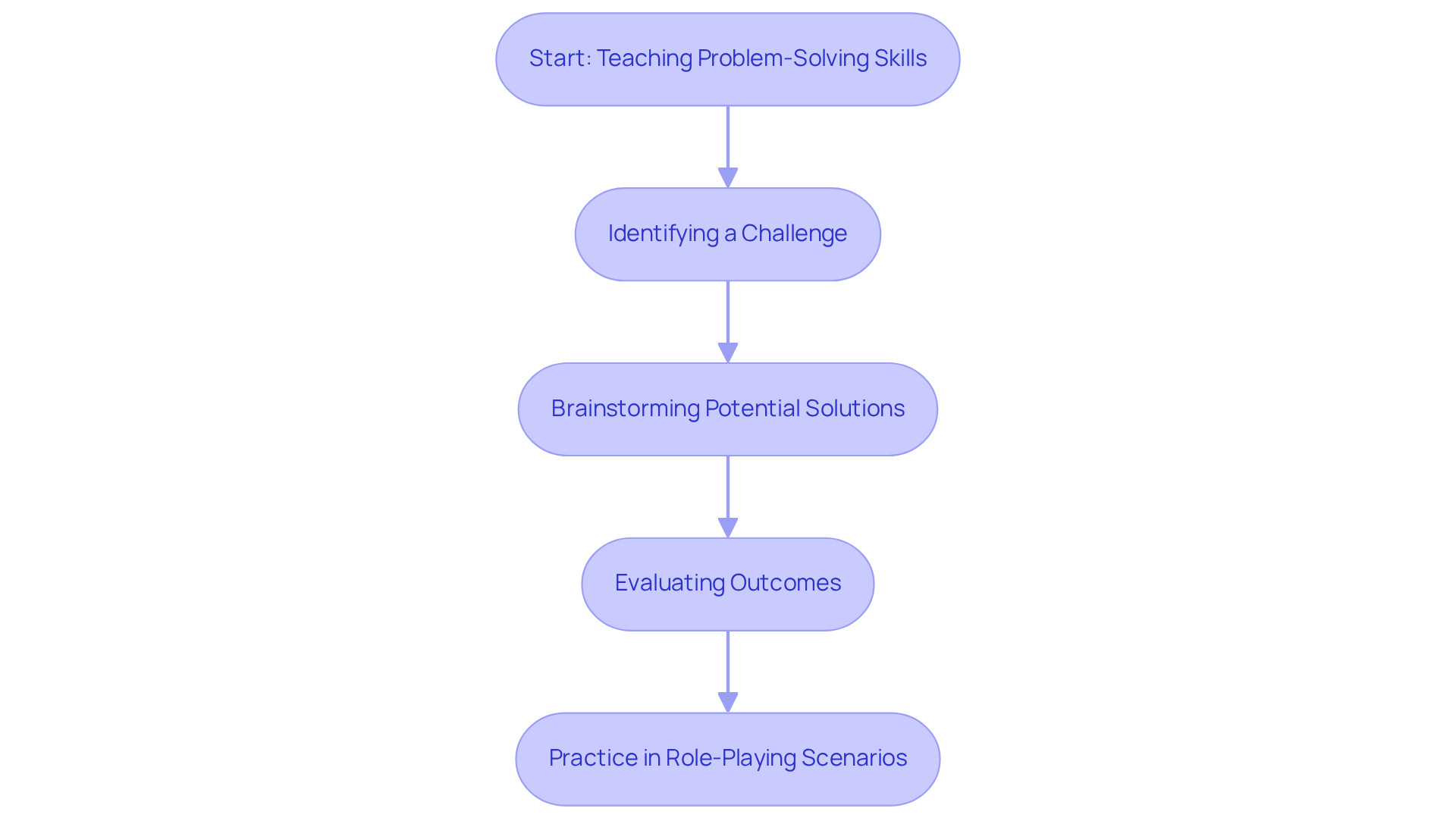
Parental Involvement: Key to Developing Social Skills in Autism
Parental engagement plays a vital role in nurturing a list of social skills for autism among children. By practicing the skills from the list of social skills for autism at home, parents can reinforce lessons learned in therapy, providing valuable feedback and creating opportunities for meaningful interactions.
Imagine family game nights or community events where your child can apply their abilities in various settings—this not only builds confidence but also enhances their proficiency in social interactions. Your involvement can make all the difference in their journey.
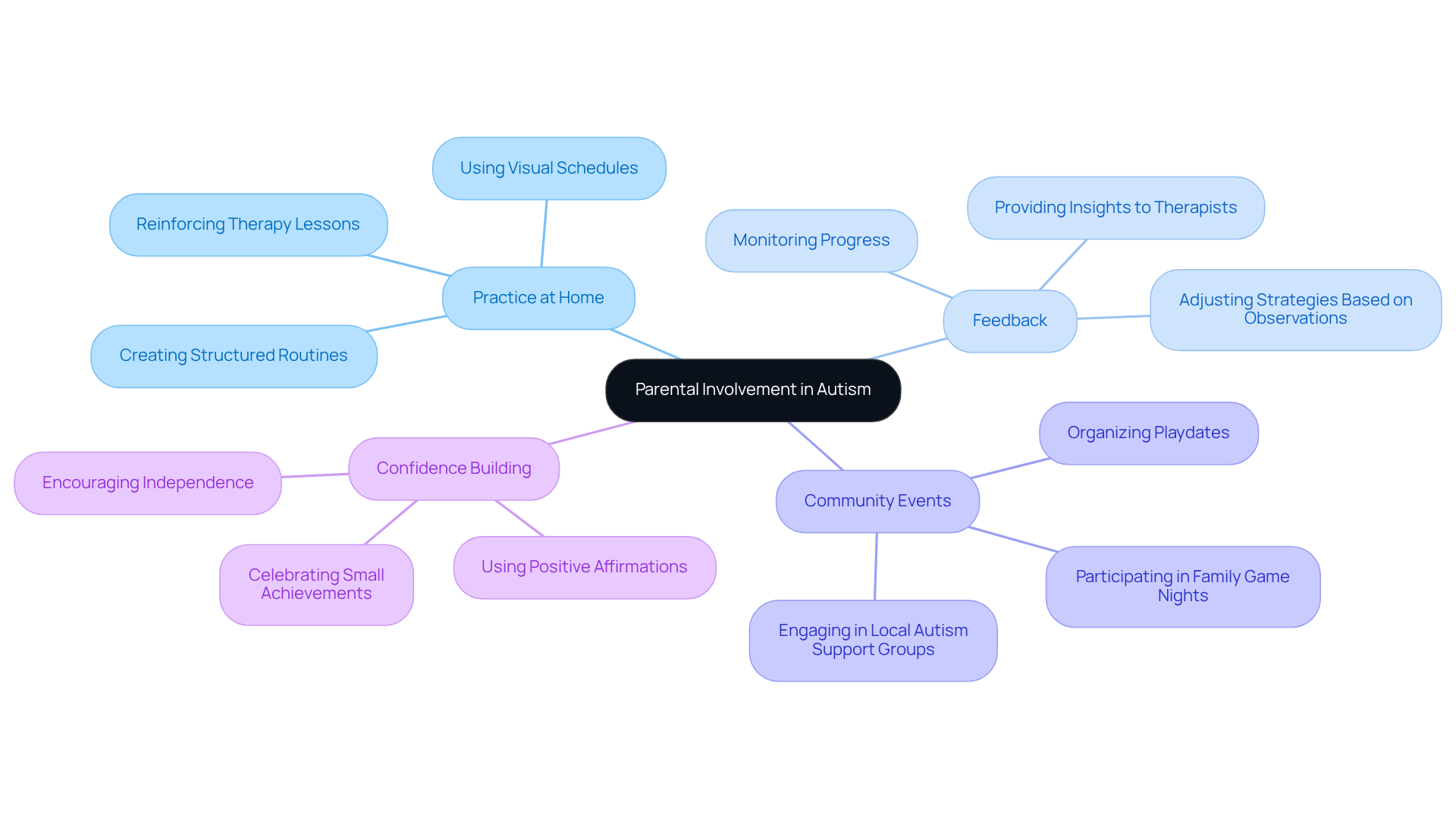
Early Intervention: Maximizing Social Skills Development in Autism
Timely assistance is crucial for nurturing the development of a list of social skills for autism in children. Research shows that initiating support at a young age can significantly enhance outcomes in communication, social interactions, and emotional regulation. Programs that prioritize interpersonal skills training from an early age equip children with essential competencies, which can be found in the list of social skills for autism, such as:
- Sharing
- Taking turns
- Recognizing social cues
These foundational skills are vital for fostering future social success.
Experts agree that structured teaching and parental involvement are key elements of effective early intervention strategies. For instance, the Early Start Denver Model (ESDM) combines Applied Behavior Analysis (ABA) with developmental psychology, providing 20 hours of therapy each week. This approach has led to notable improvements in social skills and overall development.
Research indicates that children who receive early intervention can boost their IQ by an average of 17 points and see a 60% reduction in challenging behaviors within just six months of starting therapy. Furthermore, those who benefit from early support are more likely to attend mainstream education classes and achieve higher rates of employment as adults.
As researchers have observed, the earlier the intervention begins, the greater the opportunities for young individuals to develop essential interpersonal skills and navigate their interactions effectively. This highlights the importance of timely support in shaping positive outcomes on the list of social skills for autism for children. If you are a parent, consider seeking out resources and programs that can provide the nurturing assistance your child needs to thrive.
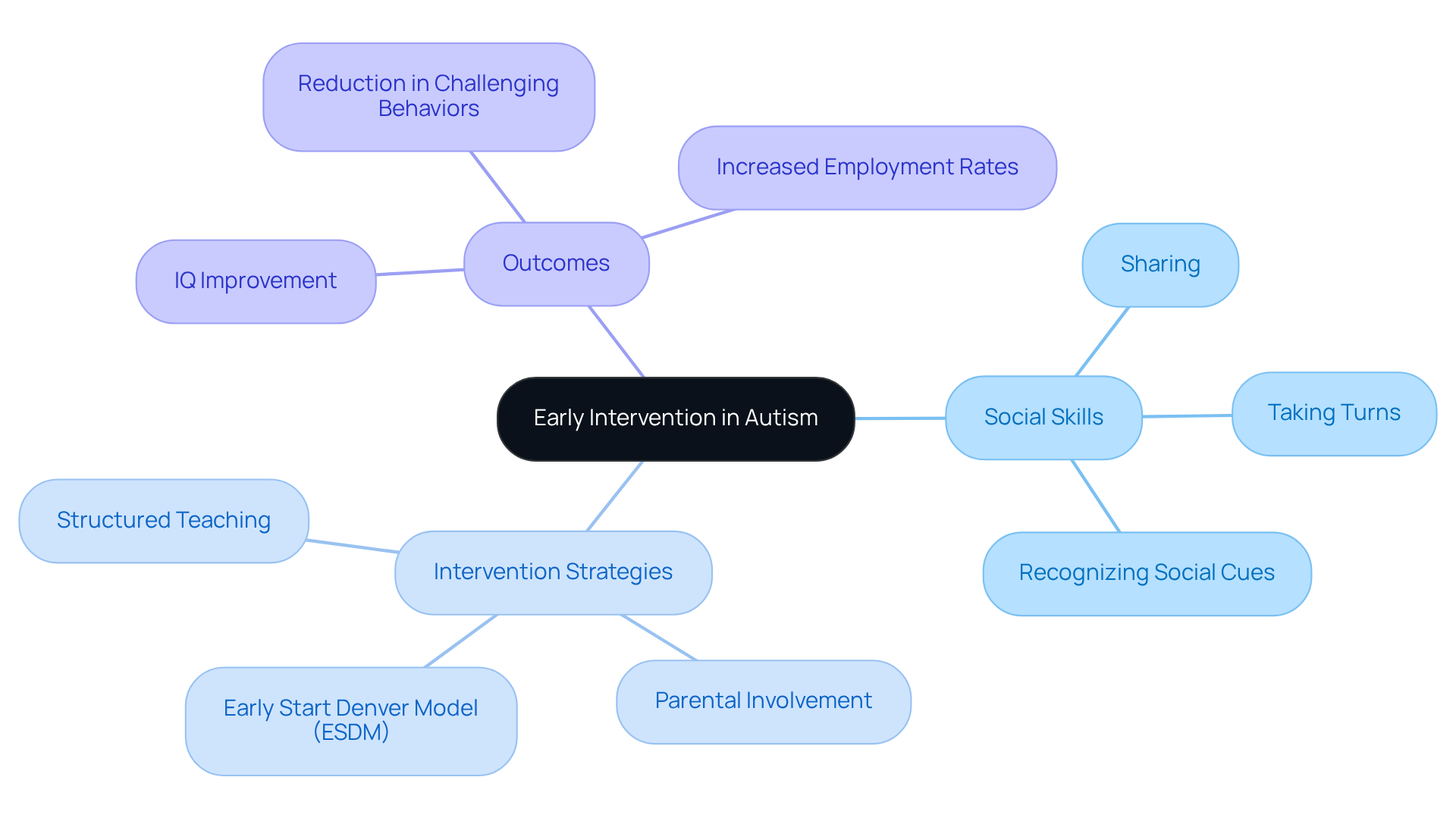
Conclusion
In summary, the development of social skills is essential for children with autism, as it equips them to navigate social environments more effectively. This article has highlighted ten critical social skills that can significantly improve interpersonal interactions and overall quality of life for individuals on the autism spectrum. By utilizing various strategies such as role-playing, social stories, visual supports, and fostering peer interactions, parents and caregivers can play a crucial role in their child's social development.
Key insights from the discussion emphasize the importance of:
- Early intervention
- Structured training
- Active parental involvement in cultivating these skills
Research shows that targeted approaches, including emotional skills development and problem-solving training, lead to notable improvements in social competence. As the prevalence of autism continues to rise, the urgency for effective social skills training becomes increasingly clear.
Ultimately, creating a supportive environment where children can practice and refine their social skills is vital. By actively engaging in their development and seeking out resources, parents can empower their children to build meaningful connections and enhance their ability to thrive socially. The journey towards social competence is not just about teaching skills; it is about fostering confidence, resilience, and a sense of belonging in a world that values interpersonal relationships.
Frequently Asked Questions
What is ASD Media's mission?
ASD Media is dedicated to enhancing the implementation of ABA therapy by providing valuable insights and strategies tailored for parents and professionals, focusing on improving social abilities for children with autism.
What resources does ASD Media offer to parents?
ASD Media offers a list of social skills for autism, along with the latest information and strategies to help families navigate the complexities of developmental disorders and support their children's social development.
Why is social skills training important for children with autism?
Social skills training is essential for children on the autism spectrum as it lays the groundwork for effective communication, helping them to initiate conversations, maintain eye contact, and interpret social cues.
What evidence supports the effectiveness of social skills training?
Studies indicate that three out of four students with autism experience improved interactions after social skills training, with a medium to large overall effect size of 0.83. For example, children participating in such training showed an increase in overall competencies from an average score of 101.25 to 129.
What methods are used in social skills training?
Effective methods include modeling, role-playing, and direct instruction, which have all shown significant improvements in a young person's ability to connect with peers and adults.
How do role-playing exercises benefit children with autism?
Role-playing exercises allow children to practice real-life social scenarios in a safe environment, helping them explore appropriate responses and behaviors while building confidence and preparing them for actual social interactions.
What impact does social skills training have on the quality of life for youth with autism?
Implementing effective interpersonal skills training can significantly improve the quality of life for youth with autism, enabling them to navigate social environments more effectively.
What is the prevalence of developmental disorders in children?
The prevalence of developmental disorders is rising, with estimates suggesting that 1 in 54 children are affected, highlighting the critical need for effective interpersonal skills training.




